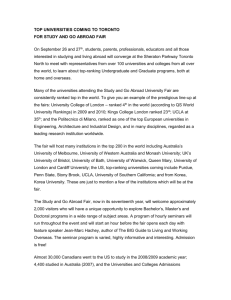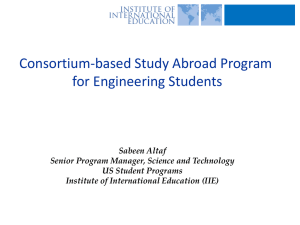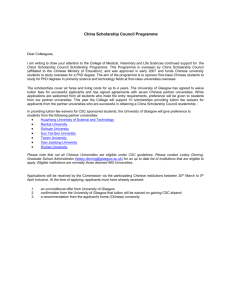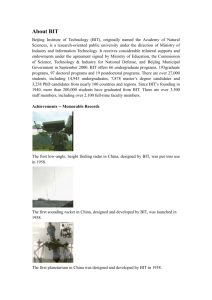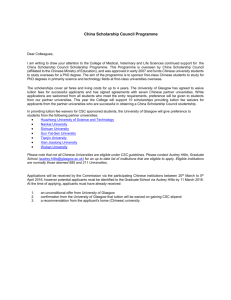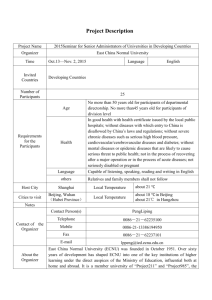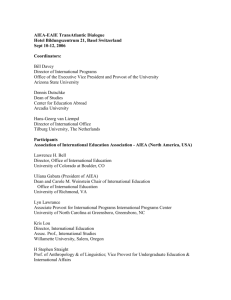Demand and Supply
advertisement
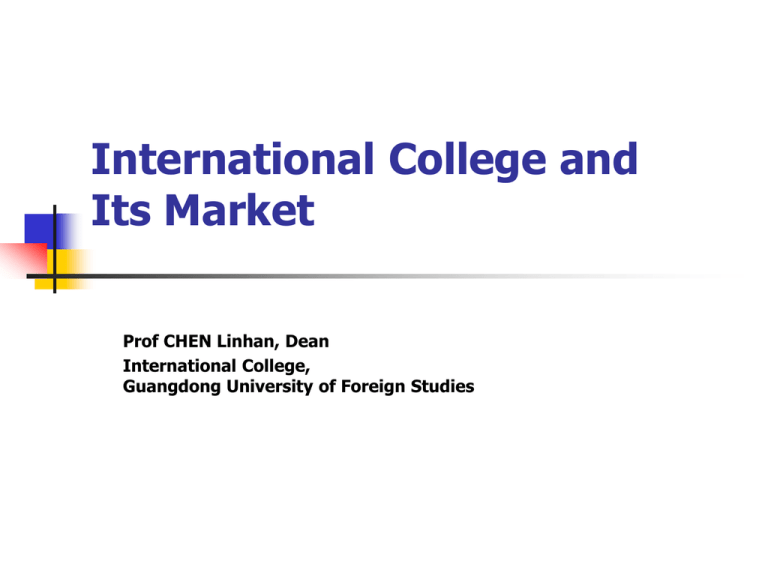
International College and Its Market Prof CHEN Linhan, Dean International College, Guangdong University of Foreign Studies Introduction Demand and Supply Successful factors Conclusion 1.Introduction The year 1999 can be noted as the watershed between past and current educational policy. The Ministry of Education: in 2008, 124 million Chinese were of college age and meeting this demand would have required 800 new colleges at a cost of $68 billion. Foreign providers have been encouraged to enter this rapidly developing market. Marijk C. van der Wende (2003) The fact that the growing and diversifying demand for higher education is not always being sufficiently met by national higher education systems creates market opportunities for foreign providers, which are actively explored by providers in mostly Western countries. Only 23 percent of young people of college age had the chance to receive a University education. Wendy W. Y. Chan (2004) : Internationalization, to certain extent, is a response to the impacts of globalization and collaboration between educational providers is one of the most efficient means to gain visibility, increase market share and sustain their competitiveness. 2. Demand and Supply SUPPLY insufficient resource of higher education in China vs comparatively “sufficient” resources of universities in the UK, USA, Australia, and Canada UK government launched a campaign of recruiting more overseas students. The universities in the USA, Canada and Australia have their own foreign students recruitment target. Margaret Kinnell (1987) Universities had sustained a cut in revenue from government of ten percent in real terms in the past five years and they would face a further ten percent cut by the end of the decade. With the prospect of such bleak financial outlook they must therefore look to other sources of revenue. Demand and Supply DEMAND Students: Only 23 percent of young people of college age have the chance to receive a University education. Universities: The universities in China vary in many respects in terms of reputation, fame, social recognition, curriculum, ranking etc. Concerns of Chinese students and parents Great difference of attractions amongst universities in China High tuition fees of studying abroad The rise and expansion of international activities in Chinese universities: Altbach & Knight (2007) Cross-border supply. This mode may include distance education (elearning) and franchising courses or degrees. It does not necessarily require the physical movement of the educational consumer or provider. Consumption abroad. The consumer moves to the country of the provider. This mode includes traditional student mobility. Commercial presence. The service provider establishes facilities in another country including branch campuses and joint venture with local institutions. Presence of natural persons. This mode includes persons, including professors and researchers, who temporarily travel to another country to provide educational services. International Colleges’ characteristics Split-site education - two years study at the home university, and one or two year’s completion of study at the partner university abroad. Localization of human capital - most of the lecturers are supplied by the home university thereby minimizing the cost base. Support from the partner university - the partner universities support the joint programs by sending staff to help teach and quality assure and enhance the programs to ensure appropriate quality. Degree awarding - the successful completion of a student’s study leads to the degree of the partner university 3. Successful factors Mazzarol’s study & educational and management practice of the International College, GDUFS Image and resources Coalition and forward integration Possession of offshore teaching programs Ability to offer a broad range of courses/programmes Quality and expertise of staff Strict administration over the students 4. Conclusion Contributions of International College Send Chinese students abroad to make use of the relative surplus of educational resources of our partner universities for their higher education Send its teaching staff to be trained abroad or jointly carry out research programmes with academic experts in our partner universities Import the advanced administrative experience and educational resources from our partners Significance of International College: Alleviate the contradictions inherent in China’s economic growth and the shortfall of the domestic educational resources provided by government Fulfills the social function of ensuring more high school graduates receive a higher education Designing the strategy for educational development in the 21st century has become a hot topic throughout the world. The existence of International Colleges is highly significant in order to develop and cultivate Chinese human resources and to improve the moral quality of the Chinese population. THANK YOU! chlpeter@mail.gdufs.edu.cn

